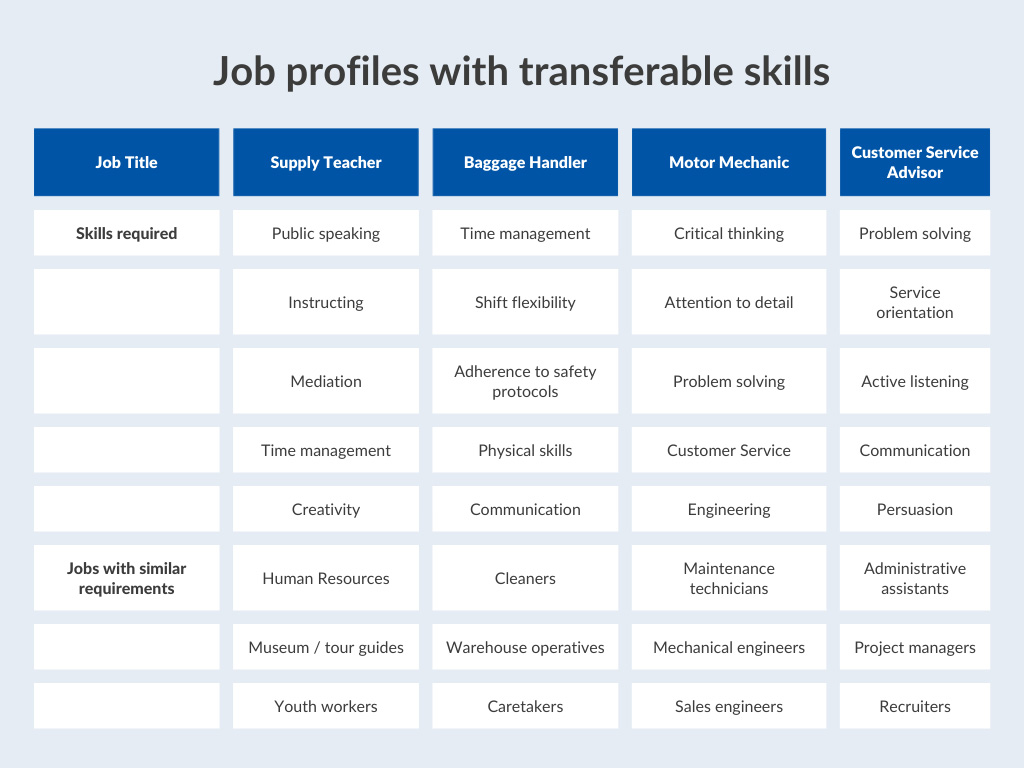- Get a quote
- Jobs
-
Employers
- Employers
-
Hire Staff
-
Our Sectors
-
Testimonials
-
About
- About
-
Our Team
-
Our Company
- Contact
- Blog
- EN | PL
Secrets of attracting candidates from other sectors

Posted by
HR GO Recruitment
on
What’s the advantage of attracting candidates from other sectors? Right now, we know there’s plenty of churn in the workplace. In fact, almost a quarter of UK employees are currently thinking whether to change roles. So if you're struggling to find qualified candidates, making jobs attractive to career-switchers could be an extra way to fill your vacancies.
In addition, an employee with a fresh perspective could find ways to apply their previous industry best practices into your sector. And this is where the magic of innovation can happen. Let's explore how to attract great candidates with the right skills:
First: make sure you’re offering the right incentives
In the current job market, it’s important to remember there are more vacancies than candidates to fill them. So, attracting employees to your workforce in an ultra-competitive market makes the right salary crucial. Being able to offer decent benefits that employees actually want is a non-negotiable. And taking training and development seriously counts for a lot, too.
Remove candidate doubts
Potential candidates considering changing industries may still not have considered your particular sector. So, you will need to demonstrate why it would be a good choice for them. Some roles are easily transferable across sectors. For instance, if a marketer has worked in the travel industry, their marketing expertise can easily be applied to the industrial sector. It just takes learning the messaging that works with the new sector. And that can be achieved with market research.
Other roles may not look so easily transferable at first glance. But clearly defining the position you’re trying to fill will help appropriate candidates self-identify. At HR GO, we work with clients every day to help them produce the clearest and most engaging job adverts and job descriptions. When it comes to attracting candidates from other sectors these things are even more crucial.
So it’s important to go beyond a brief description of the duties of the role and produce a clear definition of what the job will be about.
Identify industries with the closest comparable skills
In order to broaden your reach, you’ll want to mention other industries with compatible skillsets. So the first step to take is identifying those industries that are most similar to yours. Take a look at the examples below to get an idea of how to find commonalities between your sector and other sectors:
- Advertising – Marketing, Sales, Administration, Media, Events
- Education – Healthcare, Social Work, Human Resources, Public Sector
- Engineering – Construction, Business Management, Design, Mining, IT
- Finance – Administration, Human Resources, Logistics, Banking, Legal
- Hospitality – Marketing, Healthcare, Customer Service, Business Management
- Logistics – Manufacturing, Administration, Business Management
- Real Estate – Human Resources, Finance, Administration, Construction
Focus on transferable skills rather than qualifications
Of course, qualifications are important in many roles. But if you’re looking to attract candidates from a different sector it’s crucial to emphasise soft skills and transferable skills. This will help applicants realise where they can apply their skills and experience into a new industry and a new job role.
List the specific skills your ideal candidate will have. You want candidates who read your job advert and job description to feel that you’re talking about someone like them. The image below shows an example of a transferable skills list for multiple job roles.

It doesn’t stop there. Make sure those involved in the recruitment process know the value in these transferable skills, too. That means asking questions that bring them out in the interview process.
Take emotional intelligence for example. It’s something that will help a candidate fit better into a team, no matter their experience. There’s a guide to the right questions to ask to find out if they have emotional intelligence, here.
Highlight the positives when attracting candidates from other sectors
What’s the thing that employees in your sector enjoy the most? Could it also be the reason career-switchers want to join your industry? One example might be just that your sector is booming. If they've come from an industry that faltered during the pandemic, this could be very appealing. Job security is something high on the list of many applicants.
Another example is working from home all or part of the time. To someone whose previous roles have all been on-site, it could be seen as a huge benefit of working in your industry. The same goes for people who appreciated working from home when the pandemic started, but who are now reluctantly having to return to the office. It’s certainly something that’s currently very attractive to candidates - jobs offering flexible working get snapped up quickly.
If you can define why someone should change sectors to work for your company, use it to your advantage. Mention it in your job adverts, job descriptions and bring it up in interviews.
Attracting employees from other industries
Career-switchers are becoming increasingly commonplace in the recruitment landscape. That makes it important to think about how to make your vacancies and company more relevant to them.
We’ve talked before about how widening your talent pool may be a way to solve candidate shortages.
Attracting people from outside of your sector can also mean a more diverse workforce full of a variety of skills and experiences. And, workplace diversity is good for business. Studies consistently show it increases employee retention, produces higher innovation and results in better financial outcomes for businesses.
If you need help recruiting for you business, we're here to help. Find your local branch to connect with a professional recruitment consultant. Or, for regional or nationwide needs, contact our National Sales team.
Categories
Featured insights
How to write a great CV? Make it engaging.
Probably the most important tip on how to write a great CV is for you to make it engaging as well as informative. Here's why.
Read moreRecent insights
Widening your talent pool: A solution to candidate shortages
You may be able to solve your candidate shortage problems by tapping into these underemployed groups.
Read moreAvoid these common hiring mistakes by using a recruitment agency
We identify 6 common hiring mistakes that you can avoid by using a professional recruitment agency.
Read more